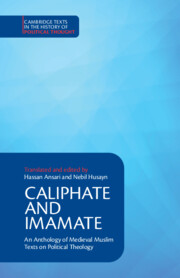Refine search
Actions for selected content:
3 results
Introduction
-
- Book:
- Caliphate and Imamate
- Published online:
- 19 October 2023
- Print publication:
- 02 November 2023, pp x-lxii
-
- Chapter
- Export citation
4 - The Curative Book on the Imamate: A Paraphrastic Rendering by al-Shaykh al-Ṭūsī
- from Selected Theological Writings
-
- Book:
- Caliphate and Imamate
- Published online:
- 19 October 2023
- Print publication:
- 02 November 2023, pp 67-106
-
- Chapter
- Export citation

Caliphate and Imamate
- An Anthology of Medieval Muslim Texts on Political Theology
-
- Published online:
- 19 October 2023
- Print publication:
- 02 November 2023
